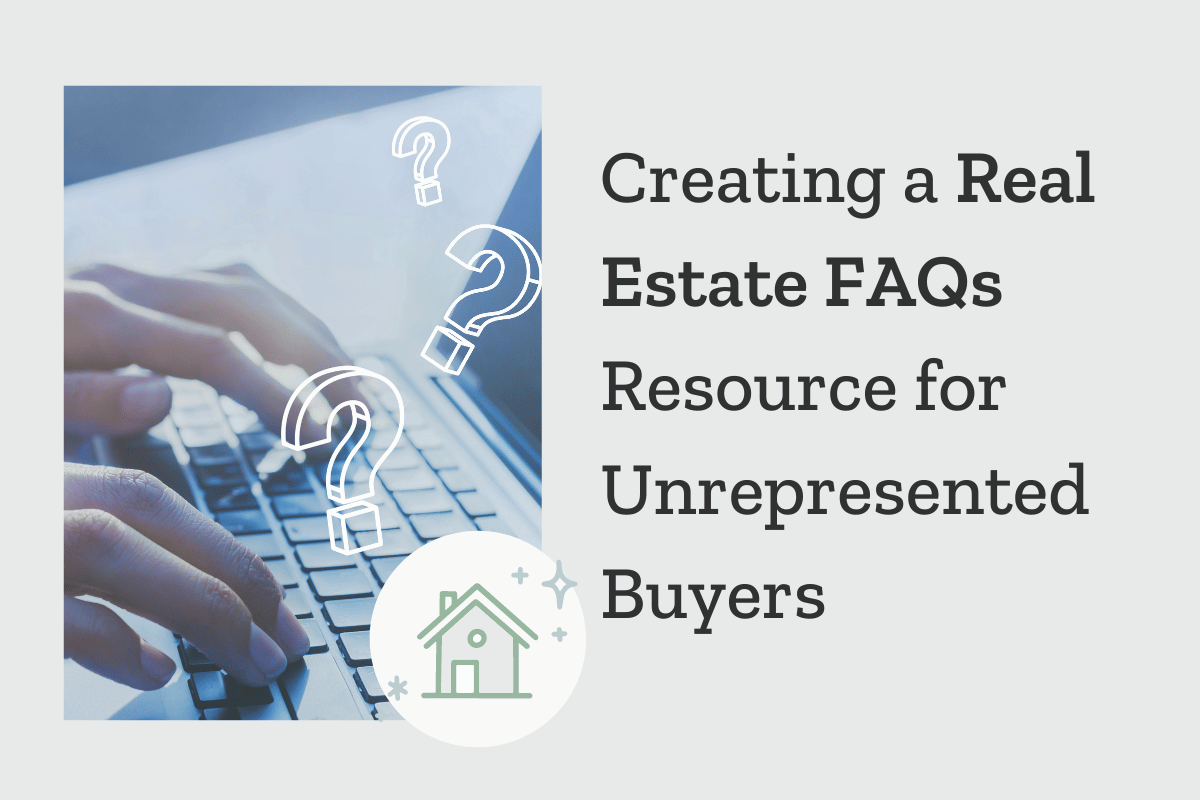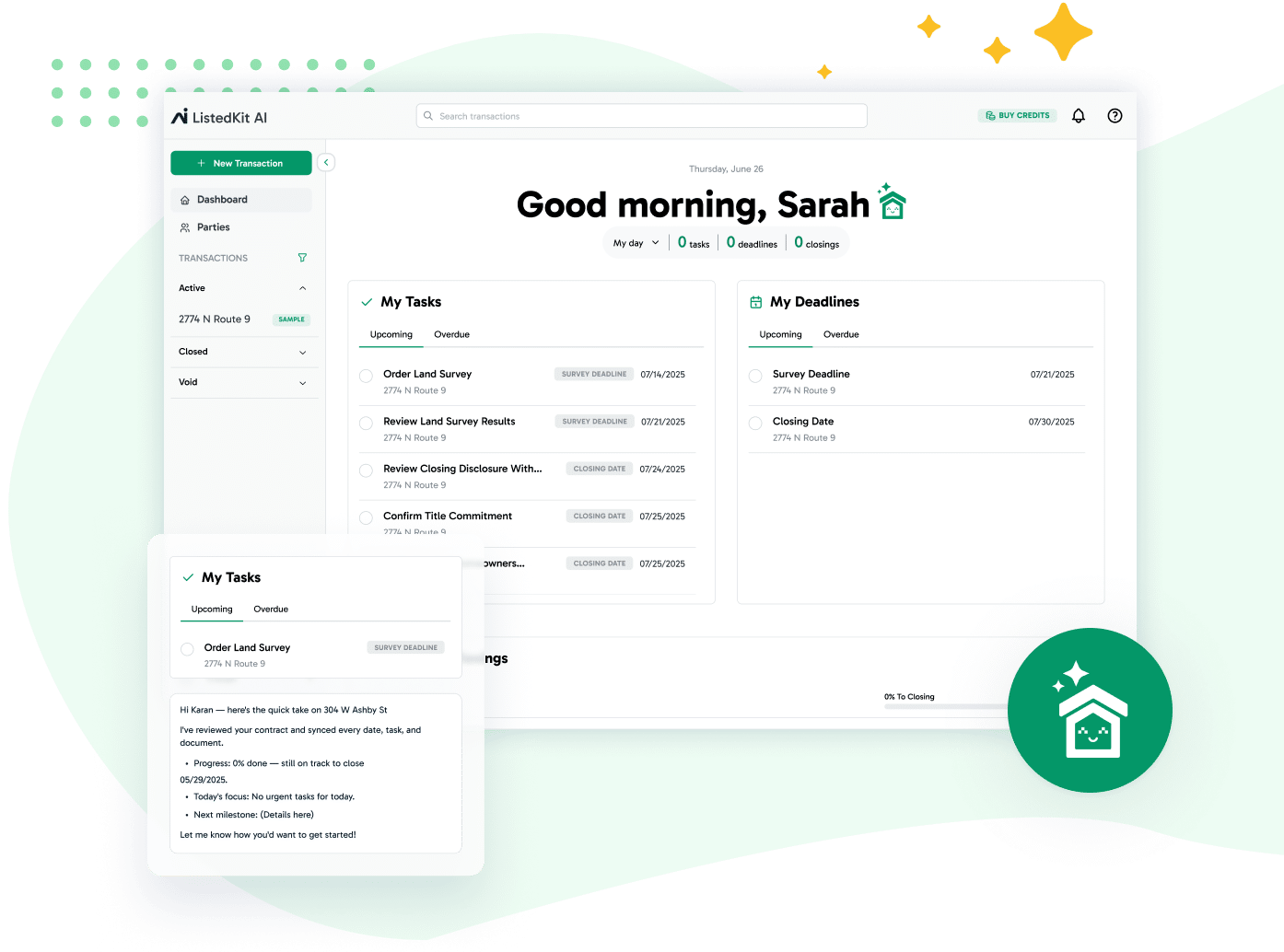Navigating real estate transactions with unrepresented buyers can be a delicate balancing act for transaction coordinators (TCs) and listing agents. Without the guidance of their own agent, these buyers often require extra support and frequently seek clarification on various aspects of the process. This can lead to repetitive questions, potential misunderstandings, and increased time demands on real estate professionals.
An FAQ resource will help alleviate these issues by providing clear answers to the questions, simplifying communication, and saving time.
In this post, we’ll walk TCs and listing agents through how to build an FAQ resource and make interactions smoother and more transparent for both parties.
Benefits of Real Estate FAQs Resource For Unrepresented Buyers
Having an FAQ for unrepresented buyers has several pros:
First, it saves time by answering common questions in one place. You don’t have to answer the same questions over and over and can focus on other tasks. For example, buyers usually ask if they can attend open houses without an agent. A glance at an FAQ page can answer that question, like explaining that open houses don’t require a buyer representation agreement.
It also makes non-represented parties feel supported. Even though they don’t have an agent, they will feel more comfortable knowing they have access to info.
FAQ resources allow you to build trust and clarity before and during the transaction. Unrepresented parties may not know who to contact for various issues. An FAQ can spell out those details and reduce uncertainty.
Lastly, it’s some sort of proactive communication that avoids misunderstandings. Unrepresented buyers can misinterpret info because they don’t have a dedicated agent. Let’s say a first-time home buyer doesn’t understand the difference between an intermediary relationship and a dual agent and how it works for them. An FAQ can explain that the listing agent represents the seller, not the unrepresented buyer, and prevent confusion and conflict.
In summary, an FAQ will benefit you and the potential buyer by reducing repetitive questions, improving the buyer’s confidence, and promoting clear communication throughout the transaction.
Questions To Include In The FAQs Resource
To help unrepresented buyers through the real estate transaction process, you need to provide an FAQ that covers all stages. Focus on preparation, offer, closing, and post-closing details so everything is clear and smooth.
We also included some sample answers you can use as a guide.
1. Pre-Offer Stage
Q: What documents do I need to bring before I make an offer?
A: Gather these:
- Proof of funds (bank statements)
- A pre-approval letter from your lender
- ID
- Recent pay stubs and tax returns
Q: How do I determine a fair offer price?
A: Look at active listings, and compare them to similar properties in the area and recent sales. Look at the property condition and current market trends.
Q: How do I get pre-approved for a loan?
A: Talk to a lender or mortgage broker. Provide financial documents like pay stubs, bank statements and tax returns. They will run a credit check and review your financial situation to determine loan eligibility.
Q: How do I find out if the property has liens or other legal issues?
A: You can request a title search through a title company, which will show any liens, claims or legal issues on the property.
Q: Can I make an offer on multiple properties at once?
A: Yes, but be careful. Make sure any offers have proper contingencies so you’re not obligated to buy multiple properties at once.
2. Offer and Negotiation Stage
Q: What is earnest money, and how much do I need to pay?
A: Earnest money is a deposit to show you’re serious about buying. It’s usually 1-10% of the price but can vary based on local customs and market conditions.
Q: What happens after I submit an offer?
A:
- The seller reviews the offer
- Seller may accept, reject or counteroffer
- Negotiations will follow
Q: What are contingencies, and why are they important?
A: Contingencies are conditions that must be met for the sale to go through. Common contingencies are:
- Financing contingency
- Inspection contingency
- Appraisal contingency
They protect your interests if certain conditions are not met.
Q: Can I negotiate repairs after the inspection?
A: Yes, you can:
- Ask the seller to fix it
- Request a credit towards closing costs
- Reduce the price to account for repairs
Q: Can the seller back out after they accept my offer?
A: Yes, but there are usually legal consequences, especially if the contract has been signed. Sellers can back out under certain circumstances, such as if contingencies aren’t met.
Q: What is a seller concession, and how does it work?
A seller concession is when the seller agrees to pay certain closing costs or provide financial assistance, which can be negotiated during the offer stage to reduce out-of-pocket expenses.
3. Closing Stage
Q: How long does the closing process take?
A: Typically, the closing process takes 30-45 days. However, this can vary based on negotiations, lender timelines, and other factors.
Q: What should I expect on the closing day?
A:
- Sign closing documents
- Pay closing costs
- Transfer title and keys
Bring government-issued ID, proof of insurance and a cashier’s check or wire transfer for closing costs.
Q: What closing costs should I budget for?
A: You have to budget for items such as:
- Loan origination fees
- Title insurance
- Appraisal fees
- Attorney fees (if applicable)
- Buyer closing costs
Q: Do I have to attend the closing in person?
A: Many buyers attend the closing in person, but depending on the closing process and local regulations, some states allow you to close by mail or online.
Q: What if my loan approval is delayed?
A: If there’s a delay in loan approval you can ask for an extension of the closing date. However, the seller must agree, and it may impact other parts of the transaction.
4. Post-Closing Stage
Q: What happens after closing?
A: Here’s the usual process after a successful closing:
- Get keys to the property
- Move in and set up utilities
- Submit any warranty requests (if applicable)
Q: How do I change the title to my name?
A: The title company will do this. They will record the deed in your name with the local government.
Q: What if issues come up after closing?
A: Contact your real estate agent or an attorney for guidance. Review the purchase agreement and any warranties that may apply to defects or issues.
Q: When will I get my property deed?
A: The title company will record the deed with the local government after closing and you should get the official deed within a few weeks.
Q: Who is responsible for the property after closing?
A: Once the transaction is complete and you get the keys, you are responsible for all property maintenance, utilities and any repairs that come up.
Phrasing Your Answers Neutrally and Informatively
Neutrality is important to maintaining trust and fairness in your role. When answering questions from buyers, use plain language so everyone can understand.
Why Neutrality Matters
- All parties feel equally represented.
- No conflicts of interest.
- Professional standards.
Here are some things you have to note when creating FAQs:
Use Clear Language
Explain terms clearly. For example, instead of saying “fiduciary duties”, say “duties to you”.
Avoid Jargon
When describing a buyer, the broker explains that this is the agent who represents the buyer in the transaction. Simplify terms like “buyer agency agreement” by saying “agreement that outlines the services and compensation for your broker”.
Provide Real-Life Examples
Giving examples or real situations will help buyers understand things better. For instance, you can do this when explaining contingencies:
“If you add a contingency it means the purchase depends on something happening, like selling your home first or getting a loan approved. This protects you from financial risk.”
Know When Not to Answer Directly
Some questions will require specialized advice. In this case, avoid giving your answers as it can cause some issues in the future. It’s best to direct them to the right people or process.
- Legal Questions. You can say, “If you have questions about the legal implications of the listing agreement talk to a real estate attorney.”
- Financial Advice. Mention something like, “For questions about the financial benefits of one broker over another speak with a financial advisor.”
Other Practical Tips for Informative and Neutral FAQ Resource
- Use bullet points for long lists.
- Be professional but approachable.
- Referrals to other professionals should be clear but neutral.
- Always keep it factual. Don’t take sides, but make sure all information is complete and accurate.
Share And Update The FAQ With ListedKit
Sharing the FAQ with ListedKit has many benefits. You can share the FAQ digitally so unrepresented buyers can always access the latest information. Here’s how:
Share the FAQ Digitally
Use smart email templates to embed the FAQ link in the email. No copy-pasting is required, and all your emails will have the latest information. Add a call to action at the end of the email to tell buyers to check and use the FAQ for more.
ListedKit’s buyers portal allows you to give them access to all important documents in one place. You can attach the FAQs document to the transaction in ListedKit so buyers can access them anytime they need to.
Regular Updates
The FAQs need to be updated. Regulations and processes change often. ListedKit’s smart checklists can help you stay ahead by updating tasks automatically when due dates or requirements change. So your FAQs stay current and relevant.
Feedback
To improve and expand the FAQ over time gather feedback from unrepresented buyers. You can do this through short surveys via email or when they log into your transaction platform. Regular feedback helps you understand new concerns or questions buyers might have.
Scheduled Updates
Make it a habit to schedule monthly updates to the FAQ. ListedKit can manage multiple transactions at once and keep track of any tiny updates that might be needed for your FAQ. This way, the information will always be current and relevant.
By using ListedKit, you can create a more efficient, better-looking, and more useful FAQ for your buyers.
Closing Thoughts
By answering questions up front, TCs can reduce the time spent on repetitive questions, increase buyer confidence, and promote clear communication. An FAQ supports unrepresented buyers and helps TCs manage transactions better.
In addition to creating a great FAQ, using a platform like ListedKit can help a lot. With ListedKit, you can share your FAQ digitally so that unrepresented buyers always have the latest information.
Now is the time to start building or updating your FAQ so you can provide the right information at every stage of the real estate process.




